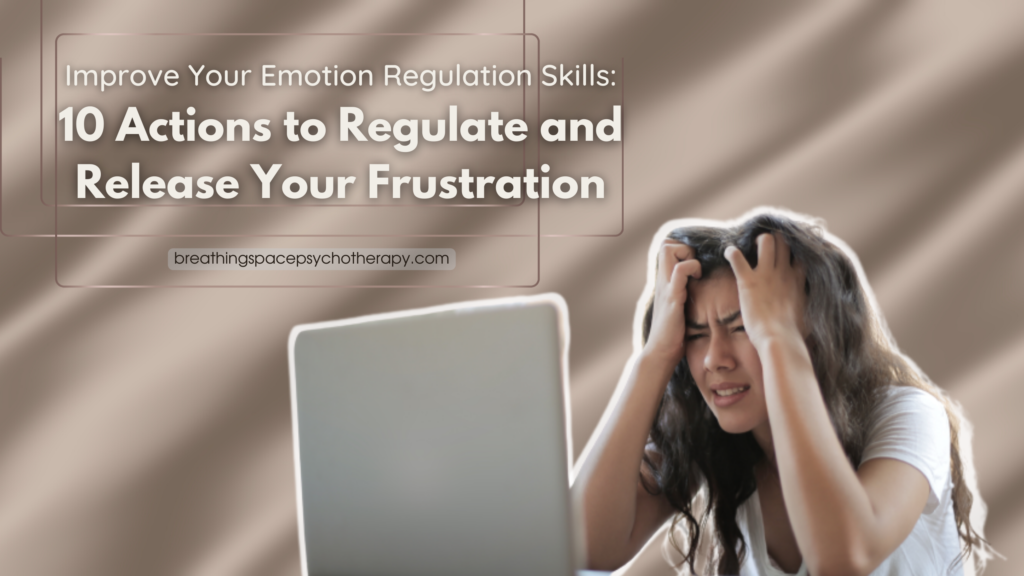Regulate Frustration: Pause
While we’re experiencing frustration, we may act out, give up, or respond impulsively. Instead of reacting in the moment, pause and try these 4 actions to regulate your frustration.
Breathe
Use deep breathing exercises to regulate your thoughts and emotions.
One of the most common breathing techniques is the 4-7-8 breathing exercise:
- Breathe in for 4 counts
- Hold for 7 counts
- Breathe out for 8 counts
- This is one breath. Complete a total of 4 breaths.
Change Your Surroundings
If possible, walk away from the source of your frustration. Physically relocating yourself can remove the reminder of frustration, disrupt your cycle of thoughts, and help you become calmer.
Move to another room, or if you are able to, step outside for fresh air; go for a walk, sit outside, or ground yourself by slipping off your shoes and walking barefoot in the grass.
Wash Your Face
Wash your face with cold water. The cold water triggers our mammalian diving reflex, which slows your heart rate. Washing your face can reduce physical symptoms of frustration and thereby reduce your emotional frustration.
Meditate: Let Your Thoughts Flow
Find a meditative practice that you enjoy and practice it when you feel frustrated. Meditation can help reduce stress, sharpen your focus, and connect with your body and emotions while also creating space between you and your frustration, so you can approach the situation with a Wise Mind.
Release Frustration: Release Built-Up Energy
Frustration holds a lot of energy and tension, which we may store in our bodies. When you’re feeling frustrated, try one of these 6 exercises to release pent-up energy.
Work Out or Practice Yoga
Physical activity is a healthy way to regulate stress and frustration. Find a physical activity that you enjoy; here are a few ways you can get active:
- Go for a run or a walk;
- Go for a bike ride;
- Play a sport;
- Play music and dance your heart out;
- Learn a choreography;
- Go to your local gym;
- Find a workout or yoga routine on YouTube that you can follow along in the comfort of your home (or outside!);
- Search for yoga poses that target a specific emotion or body part.
Play with Pets
Interacting with pets can boost our mood, lower blood pressure, and decrease levels of cortisol (a stress-related hormone).
If you have a pet who enjoys physical activity (such as a dog or a playful cat), then playing with your pet can help release tension and energy when you feel frustrated. (Plus, you get to spend quality time with your beloved pets and strengthen your bond!)
Declutter and Organize
When our physical space is messy and chaotic, our mental space may reflect this, leaving us feeling overwhelmed and out of control.
- Find an area to clean: the area can be as big as a room or as small as a shelf.
- Declutter by throwing out garbage, recycling, setting aside items you want to donate, and setting aside items that need to go back to their designated spots.
- Organize the remaining items by tidying them, placing them in their designated spots, or reorganizing them for a fresh look!
Progressively Relax Your Muscles
Progressive muscle relaxation is a technique to reduce anxiety, stress, and tension by alternating between tensing and relaxing all of the body’s muscle groups.
For a step-by-step guide to progressively relax your muscles, follow the steps in Verywell Mind’s guide, which also includes an audio recording.
Express Yourself: Create Art
Sometimes talking about our emotions and direct experiences is difficult, so it may be easier to express ourselves through the creative arts (e.g. painting, drawing, writing poetry, playing an instrument, and dancing). Find a creative art you enjoy (or try a new medium!), and let yourself go.
Express Yourself: Vent or Journal
Let your thoughts and emotions out by venting with a trusted person in a safe space or venting by yourself in an empty room.
You can also journal your thoughts if talking is difficult by writing or typing.
Venting and journaling can help you process the situation so that you can approach the problem with a level head.





